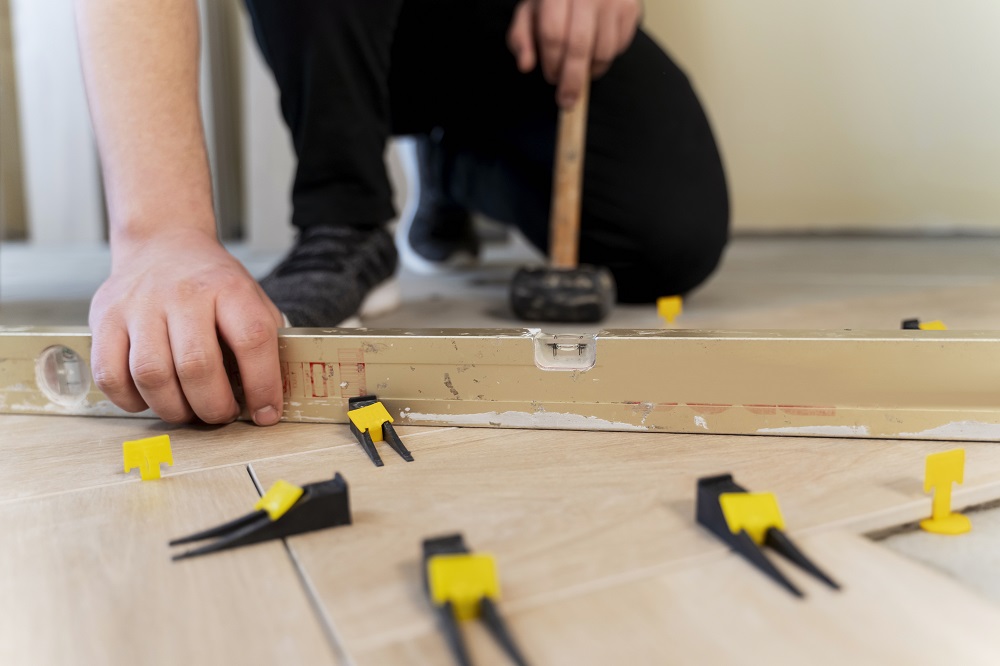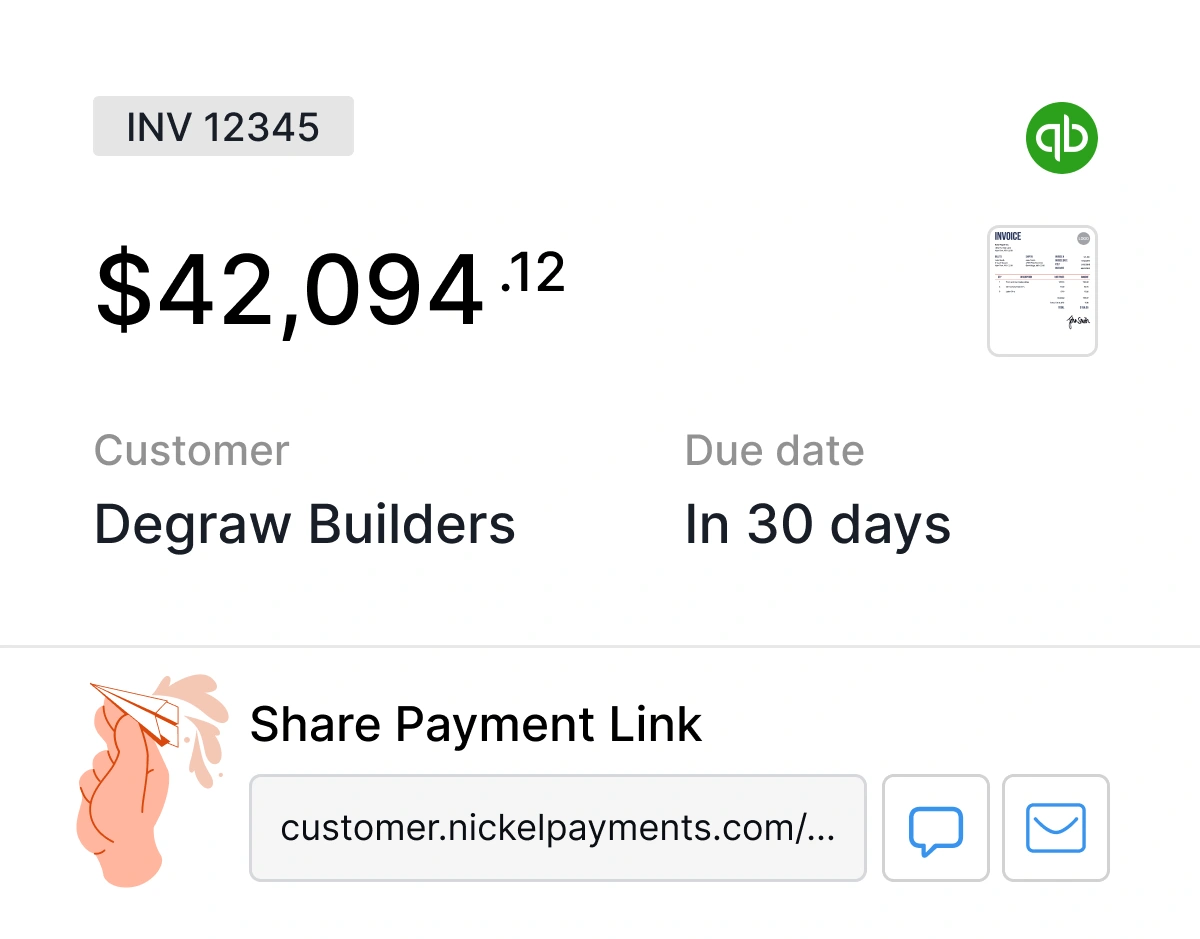The Payment Platform Built for Flooring Contractors
Lay the foundation for better cash flow with payments that actually work for flooring professionals

Trusted by 10,000+ industrial small businesses














































Why Flooring Contractors Are Switching to Nickel
Unlike traditional payment processors that treat you like a "high-risk" business, Nickel was built specifically for trade professionals who handle large invoice-based transactions. We understand that:
- $35,000 commercial flooring installations are normal business, not suspicious activity
- Material deliveries and project completions create payment surges that banks often flag as unusual
- You need reliable processing during peak renovation seasons and new construction cycles
- Your cash flow depends on predictable payment timing, not arbitrary holds
Result: No surprise account holds, no "business verification" delays, no risk department calls.

Why Flooring Contractors Are Switching to Nickel
Unlike traditional payment processors that treat you like a "high-risk" business, Nickel was built specifically for trade professionals who handle large invoice-based transactions. We understand that:
- $35,000 commercial flooring installations are normal business, not suspicious activity
- Material deliveries and project completions create payment surges that banks often flag as unusual
- You need reliable processing during peak renovation seasons and new construction cycles
- Your cash flow depends on predictable payment timing, not arbitrary holds
Result: No surprise account holds, no "business verification" delays, no risk department calls.
Before Nickel vs. After Nickel
Multiple systems for invoicing, payments, and bookkeeping
Banks freeze accounts over routine $35,000 commercial flooring jobs
Lose 1-3% on every transaction ($350-1,050 per typical job)
Banks don't understand flooring business patterns
Hours spent matching payments to invoices in QuickBooks
Everything integrated: invoicing, payments, and QuickBooks sync
We understand large and variable transactions are normal for flooring contractors and our support team is highly responsive if you ever run into issues
Keep 100% of what customers pay you
Designed around how your business actually works
Your invoices and payments automatically sync to the right customer, service call, and project, plus seamless AP integration
The Installation Delays Strangling Flooring Contractors
The $31.7 billion flooring installation industry faces unique financial pressures that generic payment processors simply don't understand. With 118,000 businesses competing in a market that's grown at just 1.3% annually over the past five years, flooring contractors are squeezed between rising material costs and increasingly demanding payment terms from general contractors and property owners.
Sequential Installation Dependencies:
Flooring installation sits at the end of most construction sequences - you can't install flooring until electrical, plumbing, HVAC, drywall, and painting are complete. These dependencies create unpredictable project timelines where delays upstream push your work back weeks or months. When electrical or plumbing runs late, you're still responsible for material orders, crew scheduling, and equipment rentals without any incoming revenue.
Material Cost Volatility and Inventory Management:
Flooring materials experience significant price fluctuations - luxury vinyl tile, hardwood, carpet, and tile costs can swing 20-40% based on supply chain disruptions and raw material shortages. A typical commercial project might require $15,000-25,000 in materials that must be ordered weeks in advance and paid Net 30 to suppliers, but customer payments often take 60-90 days after installation completion.
Progress Payment Timing Mismatches:
Unlike other trades that can bill for progress throughout their work, flooring contractors typically can't bill until installation is complete and inspected. This creates massive cash flow gaps where you've purchased materials, scheduled crews, and completed preparation work but can't invoice until the final square foot is installed. Any punch list items or corrections delay payment even further.
Specialized Equipment and Labor Costs:
Professional flooring installation requires significant equipment investment - floor sanders, nail guns, moisture meters, seaming equipment, and specialized tools can cost $50,000-100,000 for a complete setup. Skilled installers command premium wages due to labor shortages, with experienced flooring crews increasingly hard to find and retain. When customer payments are delayed, meeting payroll and equipment financing becomes a constant struggle.

The Installation Delays Strangling Flooring Contractors
The $31.7 billion flooring installation industry faces unique financial pressures that generic payment processors simply don't understand. With 118,000 businesses competing in a market that's grown at just 1.3% annually over the past five years, flooring contractors are squeezed between rising material costs and increasingly demanding payment terms from general contractors and property owners.
Sequential Installation Dependencies:
Flooring installation sits at the end of most construction sequences - you can't install flooring until electrical, plumbing, HVAC, drywall, and painting are complete. These dependencies create unpredictable project timelines where delays upstream push your work back weeks or months. When electrical or plumbing runs late, you're still responsible for material orders, crew scheduling, and equipment rentals without any incoming revenue.
Material Cost Volatility and Inventory Management:
Flooring materials experience significant price fluctuations - luxury vinyl tile, hardwood, carpet, and tile costs can swing 20-40% based on supply chain disruptions and raw material shortages. A typical commercial project might require $15,000-25,000 in materials that must be ordered weeks in advance and paid Net 30 to suppliers, but customer payments often take 60-90 days after installation completion.
Progress Payment Timing Mismatches:
Unlike other trades that can bill for progress throughout their work, flooring contractors typically can't bill until installation is complete and inspected. This creates massive cash flow gaps where you've purchased materials, scheduled crews, and completed preparation work but can't invoice until the final square foot is installed. Any punch list items or corrections delay payment even further.
Specialized Equipment and Labor Costs:
Professional flooring installation requires significant equipment investment - floor sanders, nail guns, moisture meters, seaming equipment, and specialized tools can cost $50,000-100,000 for a complete setup. Skilled installers command premium wages due to labor shortages, with experienced flooring crews increasingly hard to find and retain. When customer payments are delayed, meeting payroll and equipment financing becomes a constant struggle.
Simplified Modern Workflow
Send invoice (or use your existing invoicing)
Customer pays instantly via secure link
Payment auto-syncs to QuickBooks
Money hits your account in 2 business days
Built-in QuickBooks Integration
Your payments automatically sync to the right invoice, customer, and job. No more:


Compare: Nickel vs. Other Payment Platforms
What This Means for Your Flooring Business
Save Money
Zero ACH fees: Save $4,000-10,000 per year on a typical flooring business No hidden costs: No setup fees, monthly fees, or surprise charges Early payment discounts: Pay and get paid faster, capture supplier discounts
Save Time
Automated reconciliation: 3+ hours per week saved on bookkeeping Instant invoicing: Send payment links directly from job sites One system: Stop switching between payment apps, banking apps, and QuickBooks
Reduce Risk
Process large payments worry-free: We understand flooring transactions and provide responsive support when needed Predictable processing: Money hits your account in 2 business days Secure payments: Bank-level security without the bank headaches
Flooring Industry Payment Breakdown
The U.S. flooring installation industry generates $31.7 billion in annual revenue across 118,000 businesses, yet cash flow management remains the biggest challenge facing contractors in this highly competitive market. Understanding the financial pressures unique to flooring work helps explain why traditional payment processors fail this industry.
Market Fragmentation and Competition:
The flooring installation industry is extremely fragmented, with the vast majority being small, local contractors competing primarily on price and reputation. Most flooring businesses employ fewer than 10 workers, creating intense local competition where even small processing fees can determine which contractor wins a bid. With high competition and steady market conditions, flooring contractors operate on thin margins that can't absorb excessive payment processing costs.
Project Sequencing and Cash Flow Timing:
Flooring installation typically occurs near the end of construction projects, after electrical, plumbing, drywall, and painting are complete. This sequencing means flooring contractors have little control over project timelines - delays in upstream trades directly impact their schedules and cash flow. A study of construction projects found that less than 1% are completed both on time and within budget, creating constant cash flow uncertainty for flooring contractors.
Material and Inventory Challenges:
The flooring industry faces unique inventory management challenges. Materials must often be ordered weeks in advance based on architectural specifications, then stored until installation. Carpet, hardwood, luxury vinyl tile, and ceramic materials require specialized storage conditions and can be damaged by moisture or temperature fluctuations. When projects are delayed, contractors carry expensive inventory while waiting for installation opportunities.
Residential vs. Commercial Payment Patterns:
Residential flooring projects typically range from $3,000-15,000 and may be paid directly by homeowners upon completion. Commercial projects can exceed $100,000 but involve complex payment structures with general contractors, property managers, and multiple approval layers. Commercial payments often include retention holdbacks and require lien waiver documentation, creating additional administrative burdens and delayed cash flows.

Flooring Industry Payment Breakdown
The U.S. flooring installation industry generates $31.7 billion in annual revenue across 118,000 businesses, yet cash flow management remains the biggest challenge facing contractors in this highly competitive market. Understanding the financial pressures unique to flooring work helps explain why traditional payment processors fail this industry.
Market Fragmentation and Competition:
The flooring installation industry is extremely fragmented, with the vast majority being small, local contractors competing primarily on price and reputation. Most flooring businesses employ fewer than 10 workers, creating intense local competition where even small processing fees can determine which contractor wins a bid. With high competition and steady market conditions, flooring contractors operate on thin margins that can't absorb excessive payment processing costs.
Project Sequencing and Cash Flow Timing:
Flooring installation typically occurs near the end of construction projects, after electrical, plumbing, drywall, and painting are complete. This sequencing means flooring contractors have little control over project timelines - delays in upstream trades directly impact their schedules and cash flow. A study of construction projects found that less than 1% are completed both on time and within budget, creating constant cash flow uncertainty for flooring contractors.
Material and Inventory Challenges:
The flooring industry faces unique inventory management challenges. Materials must often be ordered weeks in advance based on architectural specifications, then stored until installation. Carpet, hardwood, luxury vinyl tile, and ceramic materials require specialized storage conditions and can be damaged by moisture or temperature fluctuations. When projects are delayed, contractors carry expensive inventory while waiting for installation opportunities.
Residential vs. Commercial Payment Patterns:
Residential flooring projects typically range from $3,000-15,000 and may be paid directly by homeowners upon completion. Commercial projects can exceed $100,000 but involve complex payment structures with general contractors, property managers, and multiple approval layers. Commercial payments often include retention holdbacks and require lien waiver documentation, creating additional administrative burdens and delayed cash flows.
Ranked #1 Easiest to Use Payment Solution by G2
See why Nickel outranks every major competitor, including Forwardly, Melio, and Square
Get Started in Minutes
No contracts. No setup fees. No risk.
Sign Up (2 minutes)
Connect QuickBooks (1 click)
Start Getting Paid (immediately)

Ready to Fix Your Payment Problems?
Stop losing money to fees and time to complicated workflows. Join thousands of contractors who've already made the switch.








